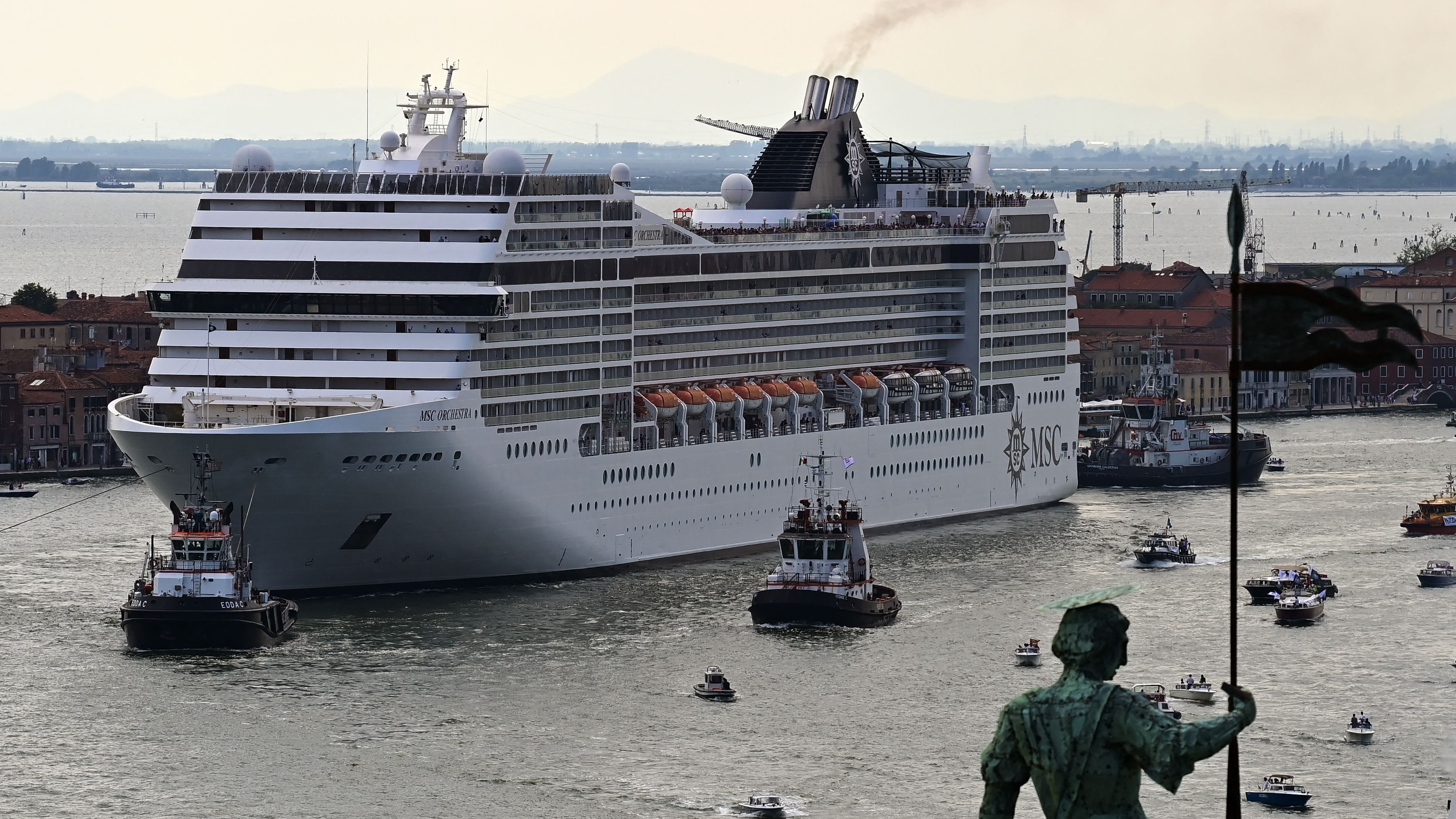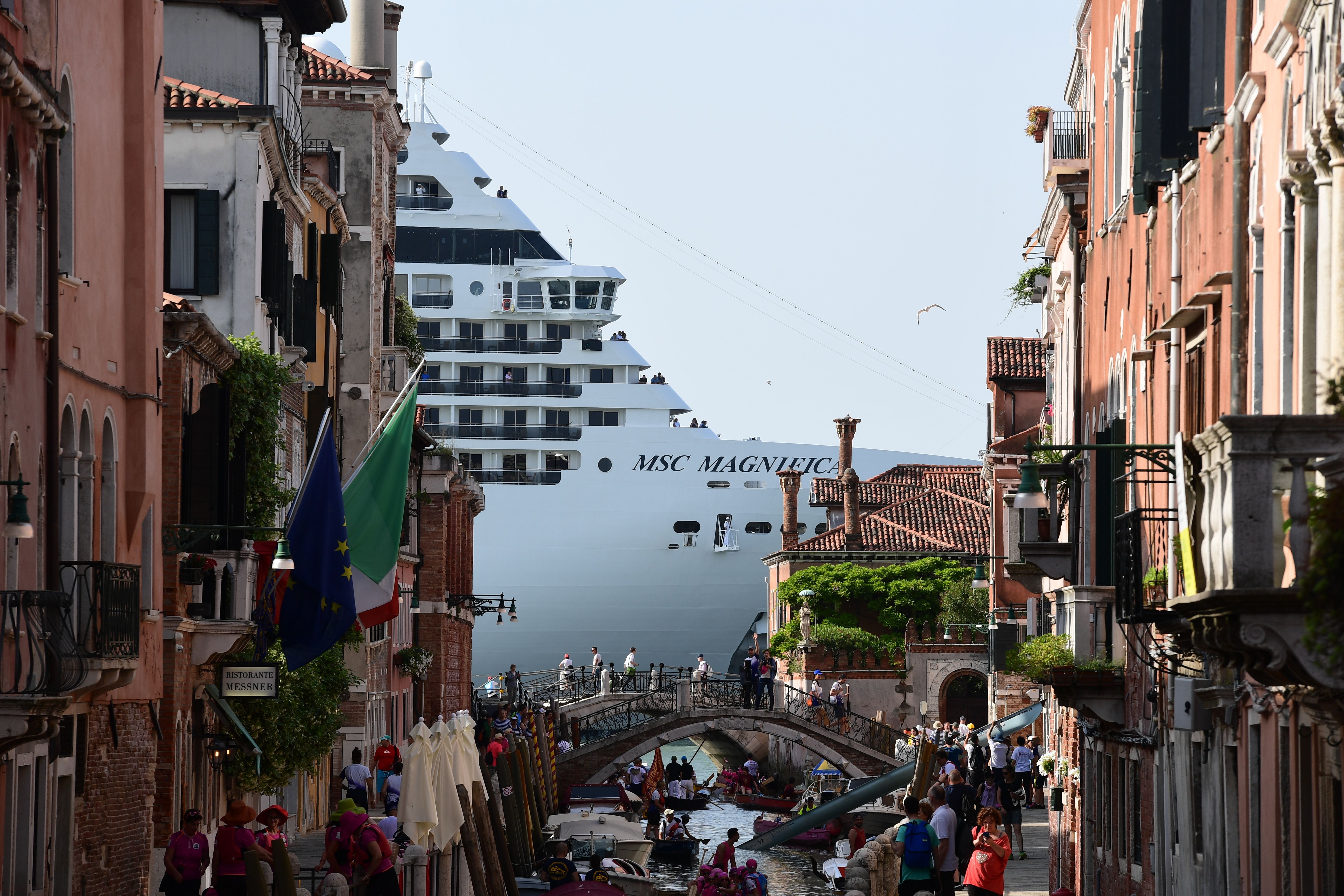Why Venice is waging a new battle in war on cruise ships
Arrival of 92,000-tonne MSC Orchestra reignites row about hosting mega vessels

A free daily email with the biggest news stories of the day – and the best features from TheWeek.com
You are now subscribed
Your newsletter sign-up was successful
The arrival of the first cruise ship to dock in Venice in 18 months has triggered a fresh wave of arguments between campaigners and the city authorities.
The Italian government announced in March that large vessels, including cruise ships and shipping containers, would be banned from Venice, in response to “concerns from residents over pollution and underwater erosion of the city’s foundations”, the BBC reports.
So the arrival of the 92,000-tonne MSC Orchestra in the so-called City of Water earlier this month “caught many by surprise” and “reawakened old divisions” in a war of words that “has pitted the economy against the environment”, says The Guardian.
The Week
Escape your echo chamber. Get the facts behind the news, plus analysis from multiple perspectives.

Sign up for The Week's Free Newsletters
From our morning news briefing to a weekly Good News Newsletter, get the best of The Week delivered directly to your inbox.
From our morning news briefing to a weekly Good News Newsletter, get the best of The Week delivered directly to your inbox.
MSC Orchestra
The huge liner sailed into the lagoon on 3 June to pick up passengers for a cruise to Greece before departing two days later. The ship “was given a victorious send-off by port workers”, who “filled about two dozen vessels that sailed alongside it”, The Guardian reports. But “it was also escorted away by a flotilla of small boats with anti-cruise ship campaigners on board”, the paper continues.
For the 5,000 people employed at Venice’s cruise port, the arrival of MSC Orchestra “was a symbol of hope for the future after more than 18 months without work” as a result of travel restrictions during the Covid-19 pandemic. But for the anti-ship demonstrators, the “visit was a reminder of a period they were hoping had been banished to the past”.
Overtourism has long been an issue of massive concern for many Venetians. A 2019 push for a referendum on greater autonomy for the floating city centred around a fear of “mass tourism, depopulation and urban decay”,as The Local reported at the time.
A free daily email with the biggest news stories of the day – and the best features from TheWeek.com
Campaigners argue that as well as fuelling these problems, the ships’ presence in the lagoon is also “negatively changing the ecosystem, and damaging the notoriously fragile city with the movement of water they cause”, CNN says.
Along with this reported environmental damage, campaigners also point to an accident in 2019, when a 13-deck cruise liner operated by the same company that owns the MSC Orchestra crashed into a wharf and tourist boat, injuring four people. In the wake of the collision, thousands of protesters hit the streets to demand a ban on larger vessels.

However, for the Venetians whose jobs depended on the 32,000 cruise ship passengers who disembarked in the city daily pre-pandemic, the ships are a vital part of the economy.
“Cruises are extremely important for us,” Venice's deputy mayor, Andrea Tomaello, told CNN. “The port generates income for our city, and it's a quality income - cruise passengers spend, and stay longer in town.”
Venice is Italy's second-busiest port and the fifth-busiest in the Mediterranean, and “the cruise sector is estimated to represent 3.2% of the local gross domestic product, so lots of workers rely on it”, Tomaello added.
The debate over whether such considerations should take precedence also has “undertones of a class struggle”, says The Guardian. Local photographer Maurizio Torresan told the paper that “it’s only the ‘radical chic’ who don’t want the big ships”.
The campaigners fighting against the cruise ships “want to turn Venice into a museum or a film set enjoyed by the few”, Torresan continued. “Cruise ships are perceived as monsters but there’s a whole social reality behind them. For the economy of Venice, we need the big ships.”
Partial ban
The ban announced by the government in March will only come into effect once new terminals are built to allow for new routes around the city centre. Plans are in place to temporarily divert cruise liners to the industrial port of Marghera while the Venice authorities organise a “call for ideas” for a long solution.
But “in reality, at least six months is needed for Marghera, which currently serves freight vessels, to be adapted for cruise passengers”, The Guardian reports. Simone Venturini, Venice’s tourism councillor, told the paper that the ban announcement was an “empty” by a government that is aiming to pass the buck.
“If the government really wanted to confront this subject without postponing a decision until the next government, it would have accepted the proposal suggested by Venice authorities six years ago,” Venturini said.
The “ultimate decisions are being taken in Rome” owing to a convoluted political hierarchy in which any policies related to Venice’s tourism industry have to be signed off by the Italian capital, CNN explains.
“The problem is that the politicians in Rome who have the power to make these decisions are out of touch with the reality and complexity of Venice’s relationship to the lagoon,” according to anti-cruise ship campaigner and environmental scientist Jane da Mosto.
“In the meantime, Venice is crumbling.”
As Europe begins relaxing coronavirus restrictions, tourists are slowly reappearing on the streets and canals of Venice. But many view the return to everyday life as a decidedly mixed blessing.
“On top of the issues of pollution and damage to the lagoon and to the foundation of buildings, there are the citizens who see the ships as an emblem of the mass tourism that has devastated Venice,” Marta Sottoriva, a spokesperson for the No Big Ships activist group, told The Guardian.
-
 The environmental cost of GLP-1s
The environmental cost of GLP-1sThe explainer Producing the drugs is a dirty process
-
 Greenland’s capital becomes ground zero for the country’s diplomatic straits
Greenland’s capital becomes ground zero for the country’s diplomatic straitsIN THE SPOTLIGHT A flurry of new consular activity in Nuuk shows how important Greenland has become to Europeans’ anxiety about American imperialism
-
 ‘This is something that happens all too often’
‘This is something that happens all too often’Instant Opinion Opinion, comment and editorials of the day
-
 Trump’s fuel blockade puts Cuba in crisis mode
Trump’s fuel blockade puts Cuba in crisis modeIN THE SPOTLIGHT Plummeting tourism, scrambling airlines and rolling blackouts are pushing Cuban society to the brink
-
 Epstein files topple law CEO, roil UK government
Epstein files topple law CEO, roil UK governmentSpeed Read Peter Mandelson, Britain’s former ambassador to the US, is caught up in the scandal
-
 Iran and US prepare to meet after skirmishes
Iran and US prepare to meet after skirmishesSpeed Read The incident comes amid heightened tensions in the Middle East
-
 Israel retrieves final hostage’s body from Gaza
Israel retrieves final hostage’s body from GazaSpeed Read The 24-year-old police officer was killed during the initial Hamas attack
-
 China’s Xi targets top general in growing purge
China’s Xi targets top general in growing purgeSpeed Read Zhang Youxia is being investigated over ‘grave violations’ of the law
-
 Panama and Canada are negotiating over a crucial copper mine
Panama and Canada are negotiating over a crucial copper mineIn the Spotlight Panama is set to make a final decision on the mine this summer
-
 Why Greenland’s natural resources are nearly impossible to mine
Why Greenland’s natural resources are nearly impossible to mineThe Explainer The country’s natural landscape makes the task extremely difficult
-
 Iran cuts internet as protests escalate
Iran cuts internet as protests escalateSpeed Reada Government buildings across the country have been set on fire